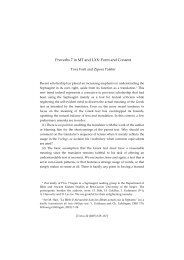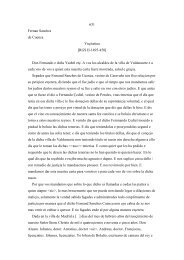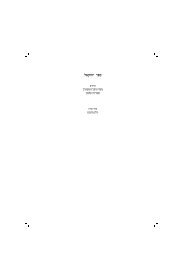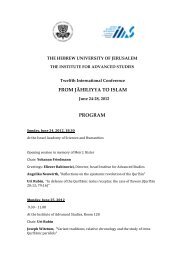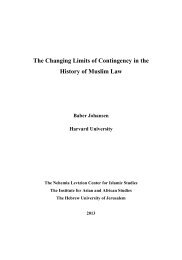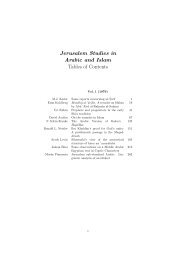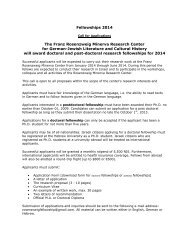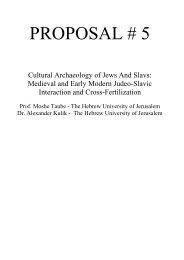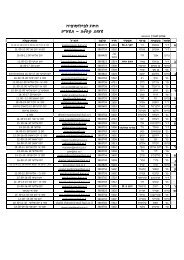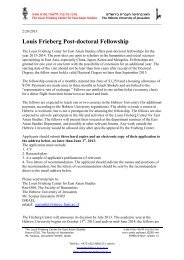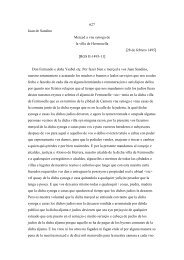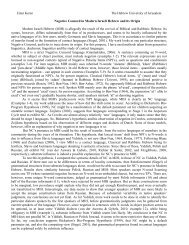THE BOOK OF EZEKIEL Moshe H. Goshen-Gottstein Shemaryahu ...
THE BOOK OF EZEKIEL Moshe H. Goshen-Gottstein Shemaryahu ...
THE BOOK OF EZEKIEL Moshe H. Goshen-Gottstein Shemaryahu ...
You also want an ePaper? Increase the reach of your titles
YUMPU automatically turns print PDFs into web optimized ePapers that Google loves.
Introduction<br />
differing in any way from `, are fully recorded. In these cases the agreement with the qeri<br />
(q) or the ketib (k) is recorded, or if there is a ketib with a keri notation; nothing was recorded<br />
when the ketib and qeri were identical with `. 112 A reading in a manuscript identical<br />
with the qeri in form and meaning, but not orthographically, is indicated by +. 113<br />
80. Graphic and verbal symbols employed in Apparatus III:<br />
> lacking in a ms<br />
~ difference in word order, transposition of words or parts of a sentence<br />
§ section (indicated before the relevant verse)<br />
.. word not completed by scribe<br />
… ellipsis<br />
! scribal error<br />
[ ] reconstructed text<br />
(?) dubious reading<br />
(pm) prima manus<br />
(sm) secunda manus<br />
marg marginal notation<br />
Targ the Aramaic Targum in a MS 114<br />
non voc unvocalized word(s)<br />
pr place before, preceded by<br />
VI. APPARATUS IV: ORTHOGRAPHY, VOWELS, AND ACCENTS<br />
Sources<br />
81. Variants recorded in this apparatus usually do not affect the meaning and form of the<br />
text. However, the accuracy of the scribe concerning these minor details, seemingly of<br />
importance only in a liturgical context, may determine the value of a ‘Masora Codex’. This<br />
seems meaningful only with regard to a small group of selected manuscripts.<br />
82. The choice of the Aleppo Codex (`) as the basic text of the edition prescribes the<br />
group of sources that may be usefully compared. In this apparatus the witnesses were<br />
selected according to type and period, specifically manuscripts close to the tradition of `<br />
112 Chapter 40 gave rise to a special problem, because of the many plural nouns with 3 pers. sing.<br />
pronominal suffixes, which tend to be written in the MSS in full spellings (e.g. e[i]l[i]`, e[i]nl[i]`, etc.).<br />
As a rule, these were considered mere differences in orthography, and therefore were recorded only<br />
in the few instances in which ` has a ketib/keri reading. MS 89 often added a keri reading eiÎ to the<br />
ketib eÎ (and sometimes also MS 150 sm, marked with an asterisk): thus vv. 21 (*enl`e, eli`e, e`ze), 22<br />
2<br />
( enl`e), 24 (*enli`e, *eli`e), 25 (enli`le), 26 (eli`, enl`e), 29 (enl`e, e`ze, eli`e, enl`le), 31 (enl`e), 33<br />
(enl`le, enl`e, el`e, e`ze), 34 (el`, enl`e), 36 (e`z), 37 (elrn, eli`, eli`e). These instances were not<br />
recorded in the apparatus.<br />
113 This holds also good for i xizi or e xizi notations, which are simply another form of qeri readings.<br />
114 Cf. e.g., app 18:11.<br />
xl



